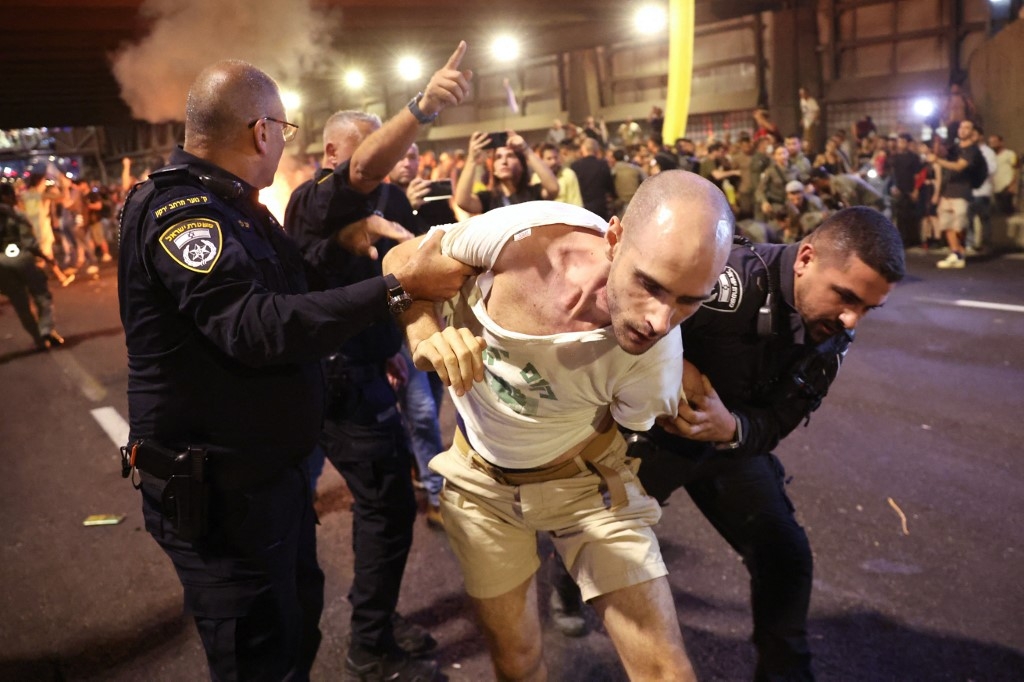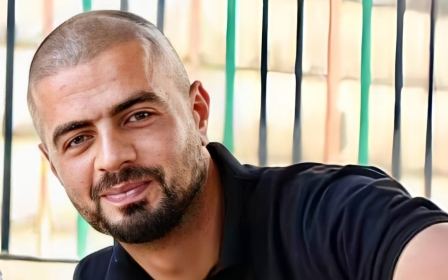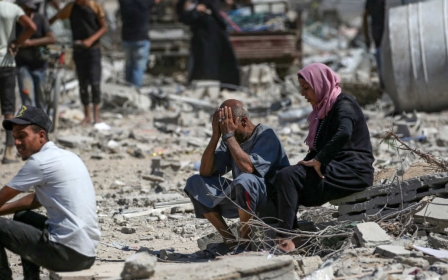Anti-government protests sweep Israel as ceasefire deal stalls

Israelis clashed with police in major cities across the country on Sunday night, demanding that Prime Minister Benjamin Netanyahu secure a deal with Gaza following the recovery of six captives on Saturday night.
The protests escalated after the head of Israel's powerful Histadrut trade union, Arnon Bar-David, announced a "complete strike" starting Monday to pressure the government to secure a deal for the release of the remaining captives.
The strike will halt the entire Israeli economy, beginning at 6:00 am local time. As part of the action, all flights at Ben Gurion airport will be suspended from 8:00 am.
Bar-David emphasized the urgency of reaching a deal, saying, "A deal is not progressing due to political considerations and this is unacceptable."
Earlier on Sunday, the Israeli military announced the recovery of six captives bodies from a tunnel in Gaza, sparking outrage and grief amongst the families.
New MEE newsletter: Jerusalem Dispatch
Sign up to get the latest insights and analysis on Israel-Palestine, alongside Turkey Unpacked and other MEE newsletters
Crowds estimated by Israeli media to number up to 500,000 strong demonstrated in Jerusalem, Tel Aviv and other cities, demanding that Netanyahu do more to bring back the remaining 101 captives.
Senior Hamas officials said that Israel, in its refusal to sign a ceasefire agreement, was to blame for the deaths.
"Netanyahu is responsible for the killing of Israeli prisoners," senior Hamas official Sami Abu Zuhri told Reuters. "The Israelis should choose between Netanyahu and the deal."
Israeli police clash with protestors
Israeli police were seen clashing with protesters on the Ayalon Highway in Tel Aviv as they try to clear the road, with some officers reportedly throwing stun grenades at demonstrators.
Israeli media reports indicate that at least 20 people have been arrested.
Member of Israeli parliament Naama Lazimi of the Labor Party shared on her X account that a stun grenade was thrown at her and her advisor, knocking them down.
"A stun grenade was thrown at me and my advisor just now. We fell from the force and panic, and then another explosion occurred, nearly hitting us directly," Lazimi wrote.
She added, "A police officer who noticed the incident quickly pulled us away from the grenade. Miraculously, [we didn't suffer] anything more terrible than a few bruises."
Israel's far-right Finance Minister Bezalel Smotrich has called on Attorney General Gali Baharav-Miara to seek immediate injunctions to prevent tomorrow’s planned general strike.
In a letter to Baharav-Miara, Smotrich argues that the strike is “clearly political and lacks any legal basis,” according to a report by The Times of Israel.
He contends that the strike was declared to improperly influence diplomatic and national security matters, which he claims fall under the jurisdiction of the political echelon and should not be subject to labour strikes.
מפגינים בתל אביב:
— חרדים10 (@charedim10) September 1, 2024
"ביבי רוצח את החטופים".
עכשיו באיילון.
צילום איציק שאג pic.twitter.com/49P4607kiK
Smotrich also pointed out that there was no advance notice of the strike and that it was organised without labour leaders having full access to national security information. He warns that allowing such a strike could set a dangerous precedent.
Former US President Donald Trump posted on social media on Sunday that the current crises over captives in Israel is "happening only because Comrade Kamala Harris is weak and ineffective and has no idea what she's doing."
He added, "I look forward to seeing her at the debate! Biden failed, and now he spends his days on the beach, plotting and scheming how to take out his former political opponent, ME, who defeated him both in the debate and otherwise."
Trump concluded, "The October 7th Israeli crisis would never have happened if I were president!"
Senior Hamas political leader Khalil al-Hiya told Al Jazeera that there will be no agreement on the release of captives or a ceasefire unless Israeli forces withdraw from the Gaza-Egyptian border and the so-called Netzarim corridors that bisects the Gaza Strip in two.
Regarding the ongoing negotiations, Hiya added that "several technical committees continued the discussions, but [Hamas] did not take part in them, and they did not reach any results."
Middle East Eye delivers independent and unrivalled coverage and analysis of the Middle East, North Africa and beyond. To learn more about republishing this content and the associated fees, please fill out this form. More about MEE can be found here.




